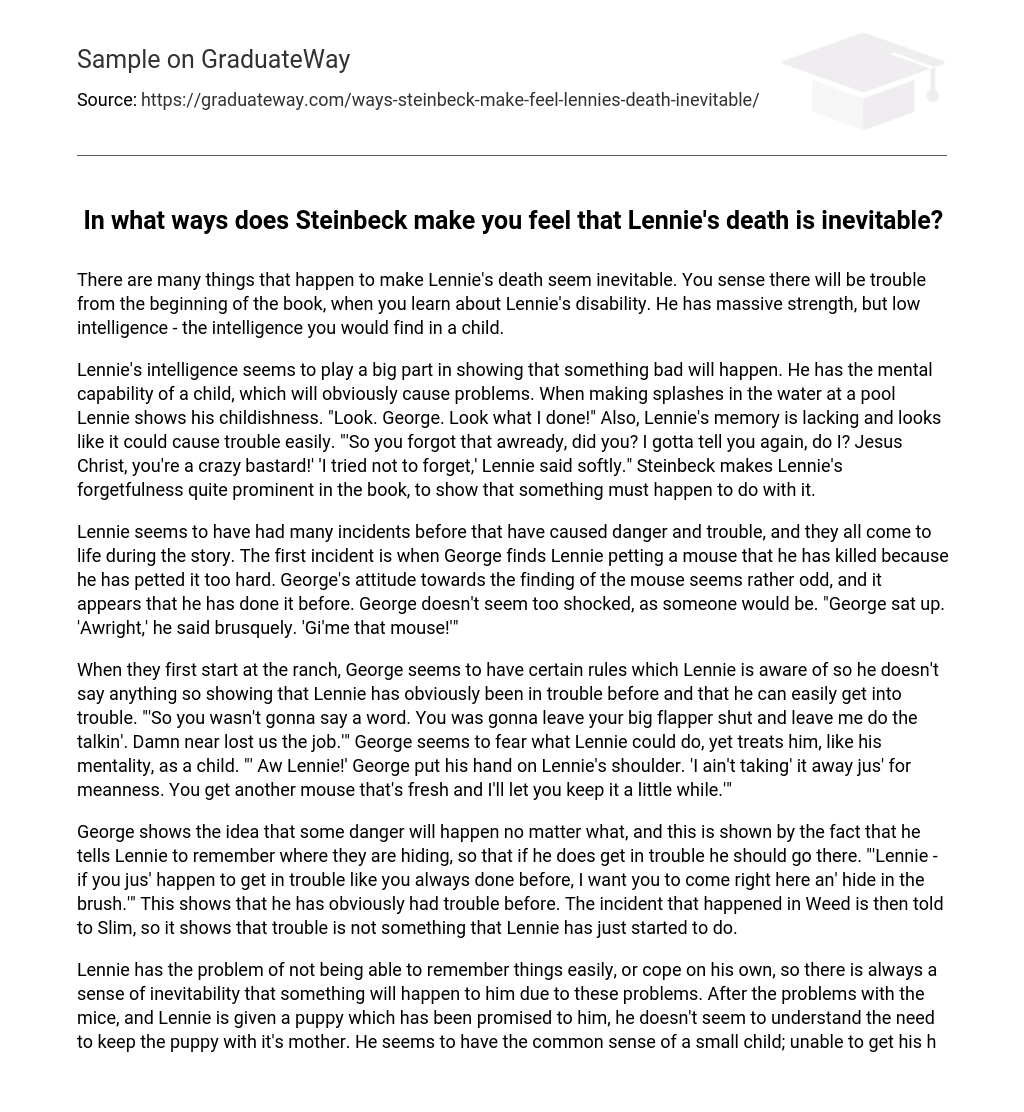There are many things that happen to make Lennie’s death seem inevitable. You sense there will be trouble from the beginning of the book, when you learn about Lennie’s disability. He has massive strength, but low intelligence – the intelligence you would find in a child.
Lennie’s intelligence seems to play a big part in showing that something bad will happen. He has the mental capability of a child, which will obviously cause problems. When making splashes in the water at a pool Lennie shows his childishness. “Look. George. Look what I done!” Also, Lennie’s memory is lacking and looks like it could cause trouble easily. “‘So you forgot that awready, did you? I gotta tell you again, do I? Jesus Christ, you’re a crazy bastard!’ ‘I tried not to forget,’ Lennie said softly.” Steinbeck makes Lennie’s forgetfulness quite prominent in the book, to show that something must happen to do with it.
Lennie seems to have had many incidents before that have caused danger and trouble, and they all come to life during the story. The first incident is when George finds Lennie petting a mouse that he has killed because he has petted it too hard. George’s attitude towards the finding of the mouse seems rather odd, and it appears that he has done it before. George doesn’t seem too shocked, as someone would be. “George sat up. ‘Awright,’ he said brusquely. ‘Gi’me that mouse!'”
When they first start at the ranch, George seems to have certain rules which Lennie is aware of so he doesn’t say anything so showing that Lennie has obviously been in trouble before and that he can easily get into trouble. “‘So you wasn’t gonna say a word. You was gonna leave your big flapper shut and leave me do the talkin’. Damn near lost us the job.'” George seems to fear what Lennie could do, yet treats him, like his mentality, as a child. “‘ Aw Lennie!’ George put his hand on Lennie’s shoulder. ‘I ain’t taking’ it away jus’ for meanness. You get another mouse that’s fresh and I’ll let you keep it a little while.'”
George shows the idea that some danger will happen no matter what, and this is shown by the fact that he tells Lennie to remember where they are hiding, so that if he does get in trouble he should go there. “‘Lennie – if you jus’ happen to get in trouble like you always done before, I want you to come right here an’ hide in the brush.'” This shows that he has obviously had trouble before. The incident that happened in Weed is then told to Slim, so it shows that trouble is not something that Lennie has just started to do.
Lennie has the problem of not being able to remember things easily, or cope on his own, so there is always a sense of inevitability that something will happen to him due to these problems. After the problems with the mice, and Lennie is given a puppy which has been promised to him, he doesn’t seem to understand the need to keep the puppy with it’s mother. He seems to have the common sense of a small child; unable to get his head round natural things.
When Curley starts showing anger towards him, and starts the fight, he does not know what to do. George had said not to do anything, so he does absolutely nothing. He relies on what George says, as his guardian. “He slashed at Lennie with his left, and then smashed down his nose with a right. Lennie gave a cry of terror. ‘George,’ he cried. ‘Make ‘um let me alone, George.'” It seems unbelievable that he wouldn’t be able to have his own opinion and the courage to make decisions on his own.
After getting used to his puppy, he starts getting too harsh, and finally kills it. He’s done something bad and he understands that he has to go. “he bent the pup’s head up and looked in its face, and he said to it: ‘Now maybe George ain’t gonna let me tend no rabbits, if he fin’s out you got killed.'” He knows that he mustn’t do anything wrong as he will not be able to tend rabbits. This is his dream, so he knows that he must be good to get it.
When he also kills Curley’s wife, it seems like it was going to happen. She offers him the stupid thing of letting him touch her hair, and it is obvious that it will go down hill from there. “‘Look out now, you’ll muss it.’ And then she cried angrily: ‘You stop it now, you’ll mess it all up.'” He doesn’t understand things, and when frightened, he cannot stop himself. It is a very child like response, and it is obvious that something will happen to him after that. After he has killed her he realises how stupid he was. “‘I done a real bad thing,’ he said. ‘I shouldn’t of did that. George’ll be mad. An’ … he said … an’ hide in the brush till he come.'”
From then on, it seems that only bad things can happen from then on to Lennie. He manages to get to the brush, but it seems very likely that he will even survive – either he will be lynched by Curley or something else fatal. His death ends the inevitability, though as he is killed by George seems less worse than being lynched. His death settles him down and finishes the book, with Steinbeck’s writing making Lennie find peace at the end. “Lennie jarred, and then settled slowly forward to the sand, and he lay without quivering.”





